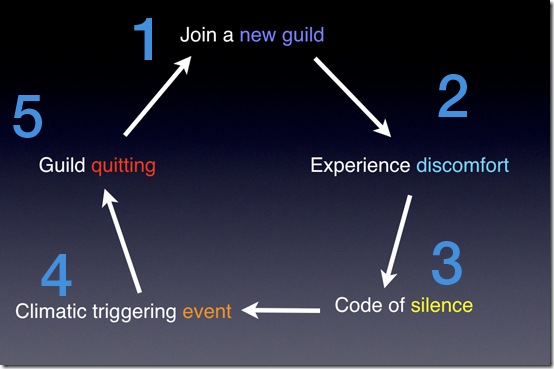Welcome back for another issue of Tough Call. This week I want to go over a topic that sets the baseline for a lot of what we do and how we can go about building the most efficient raid without imploding the guild. Before we can get to that, however, I think I need to offer a fair bit of clarification on last week’s topic.
Stay with me, people
Classification is not “name calling”. In my last post I discussed one set of archetypes (of which there are many) that could be used to sort out your raiders when determining who to take and what areas of your roster to shore up. The objective is never to belittle anyone, because honestly, putting people down takes too much time and energy that I would rather put towards being awesome myself. As for the intended message, Calaban & Lument had some great points, and yes, X, you are Rudy.
For the sake of simplicity and efficiency, some topics need to be encapsulated. This was the case last week. I could certainly turn that 901 word post into 5,000+ words about how to evaluate, coach, refine, recruit, and even alter raid tactics/comps to support the players you have. The fact that I omitted many of those elements does not mean that I am against them,or that I do not use them myself, just that they didn’t fit into the mold of that post. Trust me, there’s plenty of ground to cover when it comes to raid management, and I don’t plan to blow my whole load in these T11 pants.
One thing I will continue to believe in throughout this series is that no leader should ever “leave well enough alone”, or settle for what they already have. Every team needs to get stronger, better, faster, sexier, etc. Sometimes this happens with teamwork & growth, sometimes a pep-talk is enough, and oftentimes improvement happens by recruiting new blood. For example, we recently got a new priest who’s giving me a run for my money, and my output has increased because of it. Regardless, there would be no point to me writing this column if either of us was willing to accept the idea that you should learn to suffer through the drawbacks of today without making a better plan for tomorrow.
Lastly, every raider deserves feedback, and that feedback should be honest and constructive. Some people do benefit from mentoring, some from competition, and some from caliber of shame-filled guilt trip my mother used to lay on me… you pick which works best and run with it. Regardless, as I mentioned in the comments, your guild should have some mechanism in place to give your raiders this feedback. I know our guild has a couple different systems that work, and in the future I’ll elaborate on some of this.
Now, onto today’s topic:
Lessons in Dichotomy // Who runs this joint?
The person/people managing your raid should not be your Guild Leader.
I don’t care how awesome you are as a GM, how amazing your coordination and multi-tasking is, or how long you’ve been doing both roles. As we continue, I will illustrate how maximum efficiency and stability dictates that the GM not wear the black hat in raid.
Before we break into a list of what each person should be doing, the key assumption here is that the raid leader/officer is a specialist, hired to do one thing and do it well: motivate the team, execute digital dragons and carry back the rewards.
The job of Raid Management
- Make the raid as successful as possible
- Needs to be Honest, Unbiased, and always performance-oriented
- Make the tough decisions / wear the black hat
- Assess players based on what they bring to the raid and how well they are executing
- Manage the PERFORMANCE of the raid
- Be a clear and present leader at all times during the raid
- Get progression, achievements, titles, mounts, fame, fortune, super-model girlfriends
The job of the Guild Leader
- Be the public face of the guild
- Mediate any issues between guild members (within reason)
- Take responsibility for the guild’s reputation
- Oversee / Initiate recruiting
- Manage the PERSONALITY of the guild
- Wear the crown, take the heat, buy the drinks at Blizzcon
I know some guilds may be small/close enough that the GM thinks he/she can handle doing both. I disagree with this because these are two jobs that require different tactics and it’s human nature to have a tough time separating these and/or staying true to the goals of each position.
Even in a 10-man environment, it is never more efficient to have one person run everything than it is to have separate guild & raid management. This will also decrease/prevent burn-out among leadership.
How the Other Half Lives
Now, this separation also requires a high level of trust/confidence between the two halves. The raid officer has to trust that there are the right recruitment/retention mechanisms in place to give them the right components for a successful group. Similarly, since he/she will be handling the fall-out, the Guild Leader has to trust that the raid officer is making the right calls when it comes to who gets benched, who gets invited, who can/can’t main switch, etc.
Think of it like the relationship between Head Coach and General Manager in pro sports. These two don’t need to see eye-to-eye on tactics or day-to-day operations, but they do need to have the same objectives and a plan on how to reach them.
Show me an example
A founding member of the guild has lost his drive to raid, but still likes to come and go more-or-less as he pleases. Further, he uses his relationship with the GM as leverage to get what he wants. For the Raid Leader, this person represents a liability, as no matter how skilled they are, the risk that they will abruptly stop raiding is ever-present. If they were given a starting spot, any loot given to this player over another player could be functionally lost at a moment’s notice, and time spent learning a fight with them would have to be adapted or re-learned with their inevitable replacement. Not to mention the way this would look to other players who may be fighting to prove themselves and break into the starting lineup.
A wise Raid Leader can still utilize this person as a back-up / call-up, borrowing on his skill & experience in the good times, while still prioritizing those players who consistently show up. Bring the people who have a commitment to making your team succeed, but keep a Rolodex of viable call-ups just in case.
A wise Guild Master will remind the long-term member that the raid team is an ongoing campaign, not something that is won or lost the few times a month this person wants to show up. The GM will be clear that he expects progression from his Raid Leader, and that not everyone is entitled to raid if they cannot commit.
Another example
Recruiting! Without delving into when/how/who to recruit, it’s a very common situation for a Raid Leader to find themself needing to recruit. Good collaboration between the RL & GM requires that the RL would keep the GM abreast of the development of players within the raid, or at least give them access to any relevant information needed.
Say you need more melee dps, so you go out and recruit for that spot. The GM should know WHY the rogue on the bench isn’t being taken over new recruits, so that they can back-up the RL’s decision should the rogue come forward with complaints of favoritism/snubbing/etc. Similarly, the RL should make reasonable effort to give the GM whatever information he needs to substantiate the roster moves. Simply “he’s not good” won’t suffice, but “he missed 18 interrupts each of the last three raids” does.
Unfortunately, unlike pro sports, I’ve seen the GM fail the Coach more often than the other way around. Sometimes this is just simple burn-out, sometimes it’s close-mindedness, sometimes it’s a loss of faith by one of the two people.
The best advice I can give for longevity is for neither person to say “I can’t….”. Whether it’s “I can’t recruit another healer” or “I can’t down progression bosses with what you’ve given me” or even “I can’t stand your face”, the only way to maintain success in an efficient raid environment is to always be looking for the next opportunity. Once you’ve entered into an “I can’t” paradigm, you’re actually realizing that you should have taken action weeks ago, and are now suffering from that inaction/indecision (or worse yet, refusing to realize your responsibility in the matter). It’s up to you two to always look beyond the current week and stick to your plan you started with.
You do have a plan right?
…please tell me you have a plan.
As always, please feel free to leave any questions or suggestions for future topics in the comments below. Heck, feel free to leave your favorite bean dip recipes, too. I need something to do after I’ve cleared the raid and logged off to go watch HIMYM.





